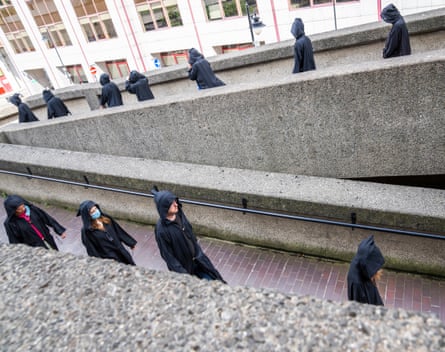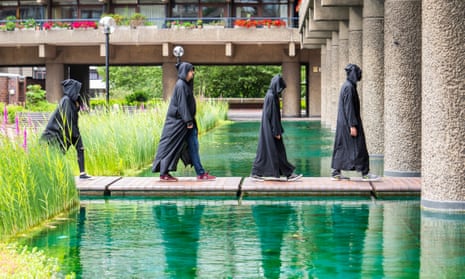There’s nothing like a stroll to get the synapses whirring, especially with Samuel Beckett for company. This particular stroll has been choreographed by Pan Pan Theatre as a slow-burning promenade production of Beckett’s 1963 radio play Cascando, winding through the Barbican’s elevated walkways with the audience listening on headphones. For a few precious moments, it makes the ordinary feel special.
The twisting, tumbling script is divided into three roles: Opener, Voice and Music. Opener (Daniel Reardon) is the conductor of this symphony as he bleats out clipped commands: Open! Close! Voice (Andrew Bennett) is an author struggling to tell one last story that will allow him to stop writing, perhaps stop living, for good. Jimmy Eadie’s music is largely made up of eerie, screeching and straining electronic strings, but with little flashes of delicate and hopeful woodwind.
The story comes in fits and starts and concerns a solitary man, Woburn, who is stumbling out to sea. The emotional emphasis in Bennett’s lilting delivery is quite something. When Bennett utters the word “Woburn”, it sounds like a caress and when he describes him falling into the sand and mud, there’s more affection than pity.

Gradually, the idea surfaces in director Gavin Quinn’s compassionate production, designed with precision by Aedín Cosgrove, that to be seen is enough. The audience, dressed in hooded black cloaks, follows a silent performer who strides ahead, always just out of reach. As we loop around the Barbican, we find ourselves looking back on each other: anonymous but observed.
There is one perfectly timed segment when Woburn reaches the sea, and the audience walks over a platform suspended above water. It’s an Alice in Wonderland moment, when fiction begins to make itself felt in the most mysterious of ways.
People entirely disconnected from the show begin to take on strange qualities. An old woman carefully progressing with her shopping trolley, a jolly man dressed in black from head to toe – they shimmer with personality and possibility, the beginning of yet unspoken stories.
At the Barbican, London, until 11 July.

Comments (…)
Sign in or create your Guardian account to join the discussion